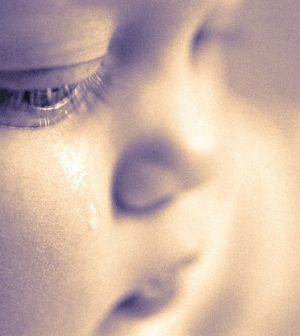- Could Your Grocery Store Meat Be Causing Recurring UTIs?
- Are You Making This Expensive Thermostat Error This Winter?
- Recognizing the Signs of Hypothyroidism
- 10 Strategies to Overcome Insomnia
- Could Artificial Sweeteners Be Aging the Brain Faster?
- Techniques for Soothing Your Nervous System
- Does the Water in Your House Smell Funny? Here’s Why
- Can a Daily Dose of Apple Cider Vinegar Actually Aid Weight Loss?
- 6 Health Beverages That Can Actually Spike Your Blood Sugar
- Treatment Options for Social Anxiety Disorder
Nose Holds Clues to Baby’s First Cold

When a baby starts sniffling and sneezing, the type of bacteria in their nose may predict how long the cold will last, a new study finds.
Babies with a wide variety of bacteria in the nose recover faster from their first cold than those with less variety, the researchers said.
“It’s well known that different types of bacteria live in our gut. The respiratory tract is also home to a wide variety of bacteria,” said study author Roland Neumann, of University Children’s Hospital of Basel, Switzerland.
“We are beginning to understand that the types and numbers of these bacteria, what we refer to as the microbiota, can influence our respiratory health,” he added.
For the study, the researchers took nose swabs from 183 babies as soon as they developed symptoms of their first cold, and again three weeks later. On average, the babies’ cold symptoms lasted about two weeks.
Babies whose symptoms lasted three weeks or longer had less variety of bacteria in their noses. Also, their nose bacteria was more likely to be dominated by the Moraxellaceae or Streptococcaceae families. Some of those bacteria are known to be linked with respiratory disease.
The study was published Dec. 2 in the journal ERJ Open Research.
The findings could help improve understanding of the role respiratory tract bacteria plays in infections and long-term conditions such as asthma, according to the researchers.
“We know that babies often suffer with coughs, runny noses, sore throats and ear infections, and in some babies the symptoms seem to drag on for weeks. These are usually caused by a virus such as the common cold, but we wanted to investigate whether the microbiota of the nose might also have a role in how long symptoms last,” Neumann said in a news release from the European Lung Foundation.
“This is important not only in terms of babies feeling unwell but also because respiratory infections in the early years are linked to the development of asthma in later life,” Neumann said.
Study author Urs Frey, chair of pediatrics at the Swiss hospital, said antibiotics and environmental factors — such as season and childcare — can alter the numbers and types of bacteria in babies’ noses.
“We do not yet know what combination of bacteria would be ‘ideal,’ and this would need to be known before we understand how we might manipulate it,” Frey said.
More information
The American Academy of Pediatrics has more on children and colds.
Source: HealthDay
Copyright © 2026 HealthDay. All rights reserved.










